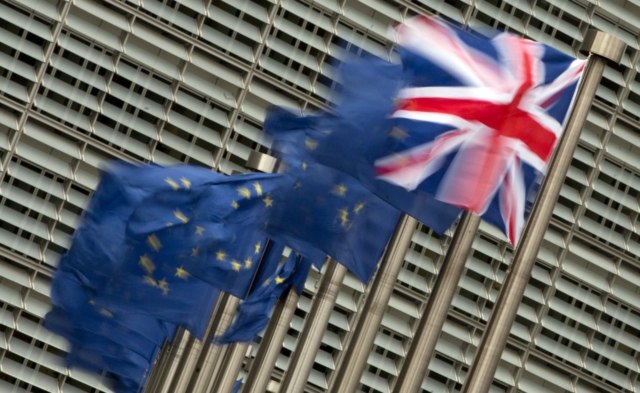Brexit and danger of "Weimar Britain"
Monday, 30.07.2018.
14:30

Brexit and danger of "Weimar Britain"
This prospect will come closest, fastest, if there is no deal on Brexit, and Britain crashes out of the European Union (EU), with what the country's top civil servant has described as 'horrendous consequences'. We have been warned that these could include miles-long queues of lorries at Dover, planes grounded, and the army called in to distribute emergency supplies of food and medicine. In such circumstances, Britain's rabid tabloids would certainly blame the chaos on the bloody Europeans – especially the French – and demand that we immediately stop paying any more money to the EU. Britain's new Brexit secretary, Dominic Raab, has already said London won't pay its agreed £39 billion divorce bill if it doesn't get a satisfactory deal. Angry Brits will go on to ask: Why should our troops be protecting faraway Europeans, when the Europeans are screwing us? And then: why not go back to the traditional British policy of trying to divide and rule on the continent?Such a Britain could also arrive more slowly, if the other 27 member states of the EU impose a humiliating divorce deal – a milder, peacetime, bureaucratic version of the punitive Versailles Treaty imposed on Germany after World War I, which sowed the seeds of German nationalist revisionism. Britain's Brexiteers are already talking about a Brexit 2.0, to follow and revise any makeshift deal cobbled together so that Britain can formally exit the EU on 29 March 2019.
Am I exaggerating the danger by even hinting at a comparison with Weimar Germany? Indeed I am. I don't seriously envisage 6 million unemployed, or a new Hitler coming to power, or a world war started by Boris Johnson. But it's surely better to overdramatise the risk, so as to get everyone to wake up to it, rather than do what most of our continental partners have done for the last two years, which is consistently to underestimate the dangers for the whole of Europe that flow from Brexit, and especially from a mishandled Brexit.
And let's face it, many things have already happened that most people would not have thought possible even a few years ago. A far right, nationalist party in Germany gaining as much support in opinion polls as the Social Democrats? Impossible! A xenophobic, lying narcissist as US president, threatening nuclear war on Twitter? Impossible!
To avert the danger of a humiliated, divided, angry 'Weimar Britain' will require wisdom on both sides of the Channel. On the British side we need three things traditionally associated with this country, but of late in short supply: pragmatic realism, a credible democratic process, and robust civility. With all its faults, Theresa May's Brexit white paper is a step towards pragmatic realism. All serious people inside government know that Britain will have to compromise some more in order to get a deal with the other 27 member states of the EU.
Assuming the EU 27 are also prepared to move, the next step in a credible democratic process is for the British parliament to have its 'meaningful vote' on that deal. Realistically, this is likely to be at the end of this year or early next year. At that point, multiple possibilities unfold, including a fudged Brexit deal securing a narrow parliamentary majority, a rejection of the deal followed by a renegotiation, a new election, or a second referendum.
Right now, the ball is in the EU's court. Amazingly, the leaders of the EU 27 have not had a major strategic discussion of Brexit since spring 2017. Since then, the negotiation has been left to the European commission team led by Michel Barnier, national officials, lawyers and Brussels theologians. They have had good reason to be firm, to protect the interests of Ireland and the integrity of the single market, and not to make Britain's deal so attractive that other countries will be tempted to 'have their cake and eat it'. But I am struck by how some of the best informed, most pro-European British experts, such as Charles Grant of the Centre for European Reform, have begun to argue that the EU 27 side is being too rigid, too exacting, too punitive in its approach. The exclusion of Britain from the high security development of the Galileo system (Europe's alternative to GPS) was a quite gratuitous slap in the face.
Yet our European partners could still reasonably say: dear Mrs May, give us a reasonable, detailed explanation of what you want, and we will respond in kind. Well, now she has. Brussels' initial response has been politely cautious, particularly insisting on clarification of the 'backstop' arrangements for keeping an open border on the island of Ireland. But in a notable article, a group of authors including Norbert Röttgen, the chair of the foreign affairs committee of the Bundestag, and Jean Pisani-Ferry, a leading French policy intellectual, have argued that the EU should now stop and think politically, not just bureaucratically, about its response. Is there no compromise at all to be made, for example, on the issue of labour mobility, if Britain wants to stay in the single market for goods? Beyond such detailed questions, this group is pointing to the need for European leaders to think strategically about how the cross-Channel relationship might look in 5 to 10 years time – which necessarily means thinking about how the EU itself will then look.
If the danger of 'Weimar Britain', with all its negative consequences for the rest of Europe, is to be avoided, then European leaders need to have that strategic discussion soon. Countries like Ireland (which has an existential stake in the UK-EU relationship), Germany and the Netherlands (major and often like-minded economic partners of the UK), and Poland (whose security depends on countries like Britain remaining committed to it) should all be pressing for such a debate. And European Council president Donald Tusk should get it on the agenda of a meeting of EU leaders in Salzburg on September 20.
In preparation, European leaders could do worse than read some history during their August break. This must include the familiar 20th century European story, which gives us those warning bywords 'Versailles' and 'Weimar', but I would also recommend Peter Wilson's magisterial history of the Holy Roman Empire. As he shows, that earlier European Union lasted so long because it proved capable of adapting to changing circumstances, living with Europe's ineradicable diversity and complexity, while still maintaining its central purpose and mystique. A lesson, I think, for today.
--------
Timothy Garton Ash is Professor of European Studies at Oxford University and a Senior Fellow at the Hoover Institution, Stanford University. His latest book is Free Speech: Ten Principles for a Connected World
Twitter: @fromTGA

























Komentari 5
Pogledaj komentare